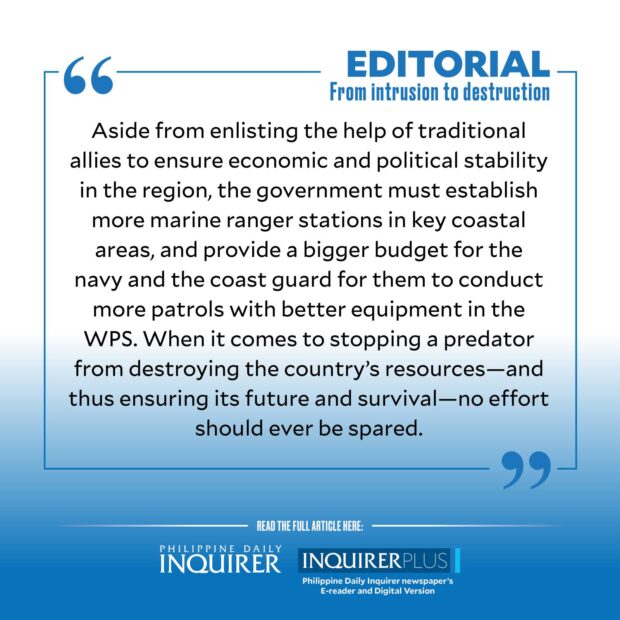From intrusion to destruction
For the longest time, the dispute over the West Philippine Sea (WPS) has centered on China’s incursions into Philippine territory as defined by a 2016 arbitral ruling, sidelining this neighbor’s just as insidious infraction: the destruction of coral reefs in its territorial waters. It’s a recurring offense seen by maritime experts as part of China’s reclamation plans in the WPS, and a ploy to drive away local fisherfolk from what would soon be depleted fishing areas, no thanks to the wanton destruction of coral reefs—the fishes’ habitat and breeding grounds.
Over the weekend, the Armed Forces of the Philippines said illegal coral harvesting in the Rozul Reef had left the seabed barren, a report backed by the Philippine Coast Guard (PCG) which said on Monday that it found “severe damage inflicted upon the marine environment and coral reef in the seabed of Rozul Reef and Escoda Shoal,” after Chinese maritime militia were spotted in these two WPS features from Aug. 9 to Sept. 11.
Article continues after this advertisement“The surveys conducted in Escoda Shoal revealed visible discoloration of its seabed, strongly indicating that deliberate activities may have been undertaken to modify the natural topography of its underwater terrain,” said PCG spokesperson for the WPS Commodore Jay Tarriela.
Citing documentation started a few years ago, Justice Secretary Jesus Crispin Remulla said it has enough evidence to file possible cases against China. “With or without a territorial dispute, the destruction of the environment is a sin against humanity,” he said. It is also, “according to the Arbitral Award, a violation of an international treaty,” noted Defense Secretary Gilberto Teodoro Jr., not to mention a breach of the Philippine Fisheries Code since giant clams are listed under the Convention on International Trade in Endangered Species of Wild Flora and Fauna.
This isn’t the first time that China has been caught conducting illegal and destructive activities on Philippine reefs and shoals. In 2012, the Philippine Navy intercepted off Panatag Shoal a Chinese fishing vessel loaded with giant clams, prompting a diplomatic note to Beijing. More recently, in 2019, the foreign affairs department said it would take legal action against China for poaching giant clams and destroying fragile corals, also at Panatag.
Article continues after this advertisementMaritime law expert Jay Batongbacal said that China’s poaching, aside from building an entire profitable industry from the harvested corals and other raw materials, is “a prelude to reclamation.” China “did this to areas they’ve turned into artificial islands,” he said, adding that materials taken from the contested waters are made into Chinese decorations, jewelry, and trinkets sold in China.
Despite repeated diplomatic protests, China’s aggressive poaching activities in Philippine waters have continued, effectively destroying our marine resources. Is there really anything we can do against this bullying neighbor with its far superior military and economic might?
Batongbacal, the director of the University of the Philippines Institute for Maritime Affairs and Law of the Sea, suggests that China’s “outrageous” collection of the country’s giant clams could be another case that Manila could take to the Permanent Court of Arbitration. Another possibility is to ask the International Court of Justice’s intervention to stop China’s destructive activity, he said.
Congress should also expedite the passage of a bill declaring the country’s maritime zones that would establish the legal basis “to ask for international cooperation to try to combat these types of activities that destroy these coral habitats,” Batongbacal said.
Why not demand that China pay for its destruction of coral reefs in the WPS, in the same way that a United States vessel that ran aground at the Tubbataha Reef in 2013 paid P87 million for a similar damage? Sen. Risa Hontiveros suggested. In a Senate resolution in April 2020, the senator noted that “unlawful Chinese activities in the WPS are estimated to have caused at least P33 billion of damage annually to marine ecosystems within the Philippines’ continental shelf and exclusive economic zone since Philippines vs. China was filed in 2013.”
The depletion of the fish catch in the WPS, which has gone down by 70 percent since 2020, must also be taken into account when computing compensation from China, the fishers’ group Pambansang Lakas ng Kilusang Mamamalakaya ng Pilipinas said, adding that the livelihood of the fishing sector and the food security of the region are at stake.
Aside from enlisting the help of traditional allies to ensure economic and political stability in the region, the government must establish more marine ranger stations in key coastal areas, and provide a bigger budget for the navy and the coast guard for them to conduct more patrols with better equipment in the WPS.
When it comes to stopping a predator from destroying the country’s resources—and thus ensuring its future and survival—no effort should ever be spared.
For comprehensive coverage, in-depth analysis, visit our special page for West Philippine Sea updates. Stay informed with articles, videos, and expert opinions.

















